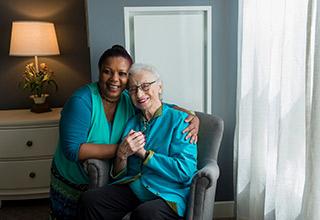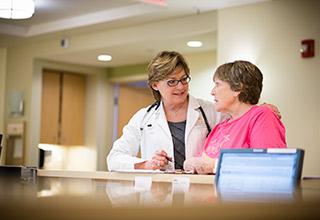Navigating Mild Cognitive Impairment: Prevention and Treatment
What you can do to build resilience and remain cognitively healthy as you age

According to the Alzheimer’s Disease International, someone in the world develops dementia every three seconds. By 2030, there will be an estimated 78 million people living with dementia, and that number is expected to continue to double every 20 years. Right now, you may be wondering what you can do to better your odds of living in good cognitive health—if you are, you’ve come to the right place.
First, it’s important to understand that dementia is not a normal part of aging. People often associate aging with declining cognitive abilities, and that’s true to some degree, but cognitive decline that seriously impacts function and quality of life is not inevitable, and many people retain excellent cognitive skills well into their 80s and 90s.
What is normal cognitive decline?
It is normal for people to experience changes in cognitive function as they age. Some changes may be positive, such as better reading comprehension, higher vocabulary, or better verbal reasoning. Cognitive decline can also be normal and is not necessarily a symptom of an underlying brain disease.
For example, many of us are probably familiar with normal age-associated memory loss. Who hasn’t had trouble remembering a word or forgotten someone’s name? Have you ever misplaced your car keys or walked into a room only to forget why you’re there? It is striking to note that individuals experiencing normal cognitive decline are often more concerned about it than others, including family members who may not see any difference. In contrast, when someone is experiencing abnormal cognitive decline, symptoms start to emerge that others can see.
What is mild cognitive impairment?
Mild cognitive impairment is a distinct clinical stage in cognitive decline that may indicate the presence of an underlying condition affecting the brain. Individuals with MCI may function fully in everyday life, even though cellular damage in their brain has already started — sometimes as early as 20 years before any symptoms appear.
Mild cognitive impairment is characterized primarily by memory problems is called amnestic MCI, and the risk of progression to dementia is thought to be particularly high. Neurodegenerative conditions, including Alzheimer's disease, vascular diseases, and Lewy body disease are examples of conditions that can cause amnestic MCI. Other causes are reversible, including B1 and B12 vitamin deficiencies, infections, and medication side effects. Therefore, MCI is not always a precursor to dementia. There are many reversible conditions that could be causing difficulty with memory and thinking that mimic signs of MCI and dementia.
Although MCI can be a predictor of dementia, it can also remain stable for years and in some cases it can even improve. With a complete picture, we can offer a more detailed prognosis and education about an individual’s disease, along with an effective plan for care that optimizes quality of life and, ideally, slows progression. For these reasons, it is important to obtain an early and specific diagnosis.
Diagnosing mild cognitive impairment
Mild cognitive impairment may be diagnosed if a person has progressive difficulties in one or more than one area of cognition (such as memory, word finding, decision making, orientation, visual abilities, etc.), but their ability to perform activities of daily living such as eating, dressing, and bathing, as well as more complex activities, such as driving, cooking, cleaning, and managing finances is not significantly affected. In about half of all cases, MCI will eventually progress to dementia.
As with dementia, MCI can be caused by different diseases or medical events. Depending on the cause, the prognosis, symptoms, and treatment may be different.
Diagnosis requires a formal neuropsychological evaluation assessing attention and concentration; learning and memory; executive, language, motor, visuospatial, and mood functions; as well as ability to perform activities of daily living along with a full neurological examination. In addition, it is essential to assess other aspects of the person’s health and lifestyle, including:
- Vision and hearing
- Nutrition and low body mass index
- Grip and muscle strength
- Motor function
- Balance
- Gait abnormalities
- Cardiovascular function
- Obstructive sleep apnea
- Metabolic and endocrine, among other medical conditions
What can you do to reduce your risk of cognitive decline?
The good news is there are steps you can take to prevent or slow mild cognitive impairment.
With the right tools, people can become resilient to conditions that threaten healthy aging. We know that modifiable risk factors account for 40 percent of worldwide dementias and therefore brain health is in many ways in our control. You can influence the trajectory of your brain health with the lifestyle choices you make.
Researchers in aging and memory have developed 10 lifestyle pillars that meaningfully reduce the risk of dementia. Here are some things you can do to :
- Reduce stress: We know that stress is a major contributor to chronic conditions, including dementias. Research continues to confirm that meditation, for example, is good for the mind and body.
- Eat well: Eat nutritionally dense and antioxidant rich foods. Avoid alcohol and other foods that offer empty calories.
- Exercise: A number of studies have shown that moderate physical activity protects against cognitive decline. I recommend 30 minutes a day, five days a week. A daily walk is a great choice.
- Sleep: The brain needs rest to rejuvenate. Recent findings suggest that sleep plays a housekeeping role that removes toxins in your brain that build up while you’re awake.
- Maintain social connections: We are social creatures and need each other to stimulate the brain.
- Stimulate your brain: Engage in novel ways to strengthen and build neuroconnectivity in the brain. Be willing to be a beginner again. Challenge yourself and learn new things that lie outside of your comfort zone.
- Foster emotional well-being: Ignoring our emotions is bad for brain health. By acknowledging the power of emotions and taking charge we can begin to learn skills that help us cope with emotions like fear and anger.
- Find meaning and purpose: Research shows that individuals with a greater sense of purpose maintain better cognitive function and have lower dementia risk.
- Mind your health: There are many medical conditions associated with the decline of brain function. Diseases like diabetes and obesity, hypertension, and stroke are associated with dementia risk. Be sure to schedule regular checkups and follow your doctor’s advice.
- Make a positive impact: Share your talents. Engaging in activities that you're good at boosts confidence and self-esteem. If these activities help others, well, that's a bonus.
The importance of cognitive reserve
Neuroplasticity, or brain plasticity, is the ability of neural networks in the brain to change through growth and reorganization — the brain has the ability to rewire itself. The term cognitive reserve refers to the plasticity of brain networks to reorganize against brain damage. In other words, cognitive reserve is a characteristic of a healthy brain that allows people to develop a reserve of thinking abilities during their lives, which makes them more resilient and protects against losses that can occur through aging and disease.
Cognitive reserve is essential for the brain to cope with the changes and challenges it will inevitably encounter with age, and to remain healthy. It enables our brains to continue to operate smoothly in the face of stress, aging, or damage from conditions like Alzheimer’s disease and other forms of dementia.
Evidence shows that people with greater cognitive reserve are better able to ward off the brain changes associated with degenerative illnesses and are even able in some cases to prevent dementia-related disability.
The future of brain health
Evidence suggests that it is very important to regularly stimulate your brain in new and demanding ways. Being willing to be a beginner again and learn new things provides cognitive training, which boosts cognitive reserve. To optimize the benefits, neurostimulation treatment, such as transcranial magnetic stimulation or transcranial current stimulation can also be used in conjunction with cognitive training.
Much of my research focuses on brain stimulation as a way to motivate neurons to make plastic changes in targeted brain networks associated with cognitive and emotional function. My goal is to optimize the connectivity of brain networks and potentially treat conditions like depression and memory decline.
At Hebrew SeniorLife’s Deanna and Sidney Wolk Center for Memory Health in Boston, we now offer transcranial magnetic stimulation to treat depression in older adults. For the last three years, I’ve been working to make another treatment called transcranial current stimulation accessible to older people in their homes by developing an educational program that will facilitate increased accessibility for participants of different demographics and locations. Research also supports transcranial current stimulation as a technique that can be used to modify the expression of brain networks and promote cognitive reserve.
We’re here to help
At the Wolk Center, we offer care for those who are concerned about possible memory loss, including strategies to optimize quality of life and cognitive function, such as neuromodulation and cognitive stimulation, as well as in-home technology, app-based games, and exercises to promote cognitive reserve. We specialize in prevention of cognitive decline, early diagnosis, specific subtype diagnosis, ongoing care for managing dementia, and more.
If you’d like to schedule a memory assessment, treatment, or family support at the Wolk Center for Memory Health, we’d love to hear from you. Call us at 617-363-8600, or contact us online.
Blog Topics
Learn More
Free Guide to Brain Health
Download our free guide, “Optimizing Your Brain Health,” for expert advice on boosting brain health at any age. Explore practical tips and resources from Hebrew SeniorLife’s Deanna and Sidney Wolk Center for Memory Health.

Wolk Center for Memory Health
The Deanna and Sidney Wolk Center for Memory Health at Hebrew SeniorLife provides outpatient memory care services, in person and virtually, for people living with cognitive symptoms — and for their families and caregivers.

The Best Health Care for Seniors
Hebrew SeniorLife is the only senior health care organization affiliated with Harvard Medical School. Members of our caregiving teams specialize in providing geriatric care, and they do so with care and compassion.

Senior Living
Hebrew SeniorLife offers a variety of senior living options, including independent living, assisted living, and enhanced living. There are options for every lifestyle and budget.





